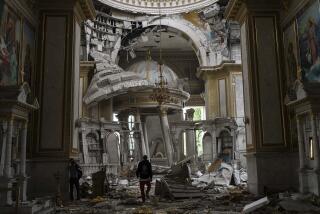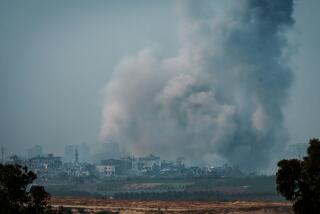Air Raids Leave Rubble, Fear in Baghdad : Scene: The Defense Ministry and ruling party headquarters are hit. But the government remains firmly in control.
BAGHDAD, Iraq — From the distance, the 11th story of the telecommunications tower in central Baghdad appears normal in the thin early morning light. Closer, however, its outline appears jagged, with large holes in the third and fifth floors.
From the other side, the damage is more evident. The cruise missile that struck the tower earlier in the morning had gutted most floors, leaving staircases and the transmitters on the roof looking as if they had been melted by intense heat.
Beginning early Thursday, government offices and strategic sites across Baghdad erupted as they were hit by missiles and bombs. The Defense Ministry and the ruling Arab Baath Socialist Party headquarters were hit, along with an oil refinery building.
Driving through the city in midmorning, my car was frantically waved down from a bridge by a man in civilian clothes with a submachine gun. Behind him, thick smoke was rising from the Defense Ministry.
People in Baghdad seem both worried and seriously detached from what President Saddam Hussein claimed again Thursday would be “the mother of all battles.”
Against the scale and sophistication of the allied air resources, there seems little the Iraqis can do, although the radio claimed Thursday that 44 attacking aircraft had been shot down. There were appeals to people not to kill pilots who bail out, but there was no sign of any captured airmen in the capital.
Despite the sense of fear in the capital, the government remains very much in control. It is difficult to see how it would begin to lose its authority. The loss of headquarters buildings is serious but not crippling because ministries and departments built alternative centers outside the capital after the Iran-Iraq War.
Not all the missiles hit their targets. The telecommunications center in the suburb of Mansur had lost some bricks but was otherwise intact. Two men showed me a piece of the missile, a heavy silver-gray fragment about eight inches long.
On the other side of the Tigris River, there was a large crater blocking the road, guarded by soldiers in black berets. They said that on no account should I approach the crater. Even when Baghdad is not under attack, antiaircraft gunners are nervous and fire occasional bursts. Near the Baghdad International Fairgrounds, the guns suddenly opened up again, and I ran into a shelter near a hospital. A man who had also taken refuge there said he “hopes the war would only last a few days.” There is no hostility from him or any others in the shelter when I say I am a British journalist.
Baghdad is a sprawling city of 4 million people, and most people live far from any explosions. However, they have an acute sense of their own vulnerability. “There seems to be an open side,” an Arab diplomat said, referring to the ease with which the allies penetrate Iraqi air defense.
More to Read
Sign up for Essential California
The most important California stories and recommendations in your inbox every morning.
You may occasionally receive promotional content from the Los Angeles Times.









